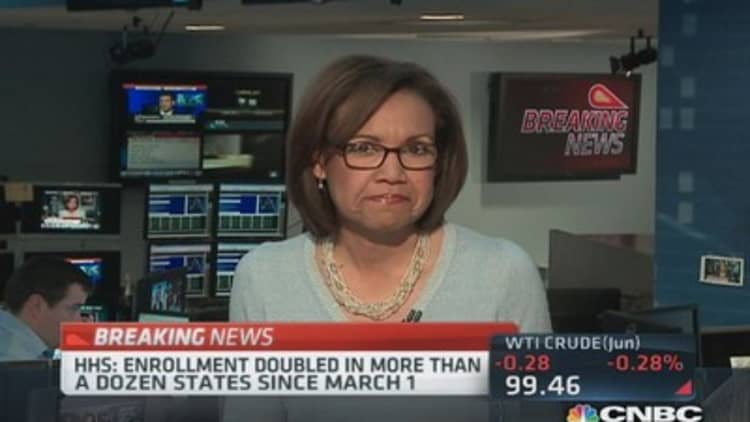A number of states whose governors were particularly hostile toward Obamacare significantly exceeded enrollment projections in the new kinds of health plans, while some of the bigger laggards were states that were the law's most enthusiastic backers.
Analysts said the higher-than-expected enrollment in some big states led by Republican governors showed the deep desire there for health insurance. The subpar enrollment in several Democrat-led states was largely a reflection of serious technical problems on their Obamacare websites.
The U.S. Health and Human Services department on Thursday revealed that 8.02 million people nationwide had enrolled in private Obamacare insurance plans, beating last summer's projection by the Congressional Budget Office by more than 1 million.
Read MoreLatest score: Obamacare enrolls 8.02 million by April 19
Twenty-six states' individual Obamacare enrollments ended up exceeding sign-up projections made for each state by the Urban Institute's Health Insurance Policy Simulation Model last year.
Stephen Zuckerman, a health economist with the Urban Institute, said, "The thing that strikes me dramatically in this updated [HHS] report is how much progress the states that were in the federally facilitated marketplace have made."
That marketplace is HealthCare.gov, the federal exchange that handles enrollment for 36 states, many of whose governors oppose Obamacare. In fact, that opposition led to most of those states rejecting their right to build their own exchanges.
Read MoreState health systems still getting a failing grade
"There was real improvement in enrollment in those states relative to their projected enrollment," Zuckerman said. "They were lagging considerably in early March."
On the federal exchange, Florida was the top performer, besting the Urban Institute's original projection by a whopping 165.7 percent. That result landed the state in a strong third place when factoring in all states, including the 14 running their own exchanges. As a rule, those are led by governors strongly in favor of Obamacare. Florida's governor is Obamacare opponent Rick Scott, a Republican.

Another Republican-led state on the federal exchange, North Carolina, came in second place on that market, exceeding the Urban Institute's projections by 145.2 percent. Michigan was in third place on the federal exchange, with 145.3 percent above enrollment projections, and Wisconsin was close behind with 144.3 percent.
Michigan's governor Rick Snyder, a Republican, bucked a GOP trend last fall by signing a law that will expand eligibility for Medicaid in the state to include more poor adults.
Texas, whose Republican governor Rick Perry has been a staunch Obamacare foe and opponent of Medicare expansion, ended up with 105.4 percent more people enrolled in Obamacare plans than had been projected.
Read MoreObamacare not hurting Obama as much: Poll
Zuckerman said that the results show "there are in fact many people that want coverage, no matter where they're located. 'Red state' or 'Blue state,' there are people that value health insurance."
However, a highlight—or lowlight—of Thursday's data dump by HHS was weaker-than-projected results from a number of states that last summer were depicted as being the vanguard of Obamacare supporters.
"There were really big boosters that bombed," noted Dan Mendelson, CEO of the consultancy Avalere Health.
Those boosters include Maryland and Oregon, which ultimately enrolled just 74.5 percent and 73 percent of the people, respectively, that the Urban Institute had projected last year.
Three other Obamacare-supportive states, Minnesota, Hawaii and Massachusetts, were among the worst-performing states, enrolling, respectively, just 64.5 percent, 46.3 percent and 36.1 percent of the Congressional Budget Office's (CBO) enrollment projections.
All five of those states have had significant tech problems with their individually run Obamacare marketplaces or exchanges.
Read More55% interest for a medical loan?! NY says no way
Oregon's exchange last week voted to turn over enrollment in private Obamacare plans to the federally run HealthCare.gov exchange, after being unable to enroll anyone at all in a single online session. Maryland is scrapping its existing exchange software and plans to replace it with Connecticut's exchange model—which helped enroll 139.2 percent of the people the CBO estimated it would.
Mendelson said the problem-plagued performance of those state-run exchanges would make it unlikely that any the states that are completely reliant on HealthCare.gov would seek to build their own exchanges.
Mendelson's company, which ran an analysis based on its own projections of enrollments in each state, estimates that just 22 percent of states will actually end up beating Avalere's projections, assuming that 15 percent of enrollees don't pay their first month's premiums—a rate that is in line with what insurers have been reporting to date.
But Mendelson said that over the next five years, he expects less disparity in enrollment levels between states.
"The delivery system will drive commercial interest in Obamacare, because people who lack insurance are going to hear from their physicians, hear from hospitals, 'You should sign up,'" Mendelson said. "That's going to happen in Texas, it's going to happen in California."


